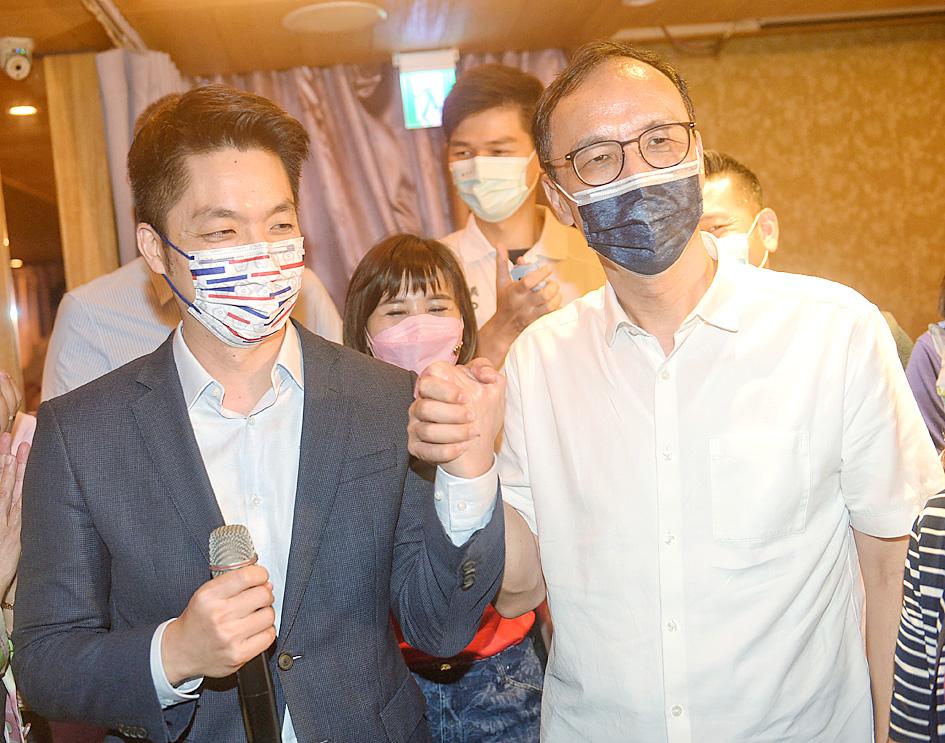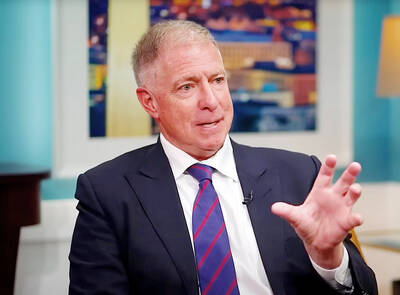Chinese Nationalist Party (KMT) chairman-elect Eric Chu (朱立倫) is to assume leadership of the party at a ceremony on Tuesday next week, a KMT official said on Wednesday.
Chu, who won the KMT chairperson election on Saturday last week, is to take over from KMT Chairman Johnny Chiang (江啟臣).
The handover date was decided on Wednesday at a meeting of the KMT’s Central Standing Committee, which also confirmed the results of the chairperson election and approved Chiang’s resignation, the KMT official said.

Photo: Chang Chia-ming, Taipei Times
Chiang, a legislator from Taichung, has been serving as interim chairman of the opposition party since March last year, when his predecessor, Wu Den-yih (吳敦義), resigned following the KMT’s resounding defeat in the presidential and legislative elections in January that year.
At Wednesday’s meeting, Central Standing Committee member Lin Chin-chieh (林金結) proposed that Chu assume leadership of the party as soon as possible, in light of national referendums in December and an imminent need for fundraising to maintain the party’s operations, the KMT official said.
The committee decided to hold a ceremony on Tuesday next week, at which Chiang would hand over the party leadership seal to Chu, who previously served as KMT chairperson from 2015 to 2016, the party official added.
In a meeting with party members in Yilan County on Wednesday, Chu said that as KMT chairman, one of his top priorities would be to campaign for a recall of Taiwan Statebuilding Party Legislator Chen Po-wei (陳柏惟) in a vote on Oct. 23.
The recall campaign was initiated by Yang Wen-yuan (楊文元), one of Chen’s constituents, who said that the lawmaker had been neglecting his constituency, behaving outrageously in the Legislative Yuan and on social media, and supporting the government’s decision to lift a ban on imports of pork containing traces of ractopamine.
Separately on Wednesday, China’s Taiwan Affairs Office spokeswoman Zhu Fenglian (朱鳳蓮) said that an exchange of messages between Chu and Chinese President Xi Jinping (習近平) after the KMT chairperson election showed that their parties both oppose Taiwanese independence and favor the so-called “1992 consensus.”
On Sunday, Xi sent Chu a congratulatory message, in which he reiterated the importance of the so-called “1992 consensus” and China’s opposition to Taiwanese independence.
In response, Chu said he hoped that the two parties would move toward common ground, while respecting their differences, with the so-called “1992 consensus” and opposition to Taiwanese independence serving as a foundation.
The “1992 consensus” — a term that former Mainland Affairs Council chairman Su Chi (蘇起) in 2006 admitted making up in 2000 — refers to a tacit understanding between the KMT and the Chinese Communist Party that both sides of the Taiwan Strait acknowledge that there is “one China,” with each side having its own interpretation of what “China” means.

A total lunar eclipse coinciding with the Lantern Festival on March 3 would be Taiwan’s most notable celestial event this year, the Taipei Astronomical Museum said, urging skywatchers not to miss it. There would be four eclipses worldwide this year — two solar eclipses and two lunar eclipses — the museum’s Web site says. Taiwan would be able to observe one of the lunar eclipses in its entirety on March 3. The eclipse would be visible as the moon rises at 5:50pm, already partly shaded by the Earth’s shadow, the museum said. It would peak at about 7:30pm, when the moon would

A New York-based NGO has launched a global initiative to rename the nation’s overseas missions, most of which operate under the name "Taipei," to "Taiwan Representative Office (TRO)," according to a news release. Ming Chiang (江明信), CEO of Hello Taiwan, announced the campaign at a news conference in Berlin on Monday, coinciding with the World Forum held from Monday through Wednesday, the institution stated in the release. Speaking at the event, Democratic Progressive Party Legislator Huang Jie (黃捷) said she believed this renaming campaign would enable the international community to see Taiwan

DEFENSE: The US should cancel the US visas or green cards of relatives of KMT and TPP lawmakers who have been blocking the budget, Grant Newsham said A retired US Marine Corps officer has suggested canceling the US green cards and visas of relatives of opposition Taiwanese lawmakers who have been stalling the review of a proposed NT$1.25 trillion (US$39.7 billion) special defense budget. The Executive Yuan has proposed the budget for major weapons purchases over eight years, from this year to 2033. However, opposition lawmakers have refused to review the proposal, demanding that President William Lai (賴清德) first appear before the Legislative Yuan to answer questions about the proposed budget. On Thursday last week, 37 bipartisan US lawmakers sent a letter to Legislative Speaker Han Kuo-yu (韓國瑜), the heads

TOO DANGEROUS: The families agreed to suspend crewed recovery efforts that could put rescuers in danger from volcanic gases and unstable terrain The bodies of two Taiwanese tourists and a Japanese pilot have been located inside a volcanic crater, Japanese authorities said yesterday, nearly a month after a sightseeing helicopter crashed during a flight over southwestern Japan. Drone footage taken at the site showed three bodies near the wreckage of the aircraft inside a crater on Mount Aso in Kumamoto Prefecture, police and fire officials said. The helicopter went missing on Jan. 20 and was later found on a steep slope inside the Nakadake No. 1 Crater, about 50m below the rim. Authorities said that conditions at the site made survival highly unlikely, and ruled